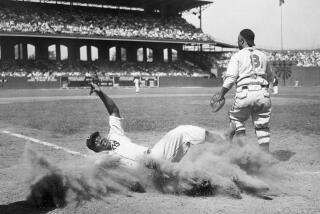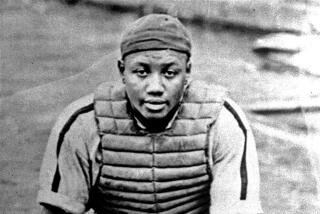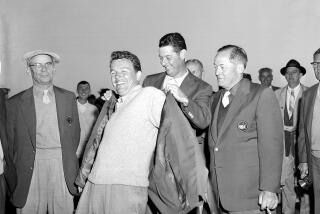Former Major Leaguer Tries to Get Group Out of the Deep Rough : Golf: Jim Grant, a pitcher from 1958 to 1971, now runs the Black Golfers Assn. Tournaments. The organization exists to give blacks more opportunities to play and polish their games.
Former major league pitcher Jim (Mudcat) Grant wouldn’t mind if one of his current enterprises goes out of business.
Grant, whose major league career began in 1958 and ended after the 1971 season, would like to see his Black Golfers Assn. Tournaments become so successful that there would no longer be a need for it.
BGAT, which he started in 1986, sponsors tournaments primarily for black professional golfers, but the number of its tournaments and their purses are a far cry from those of the Professional Golfers’ Assn.
BGAT has staged no more than four tournaments annually in the past five years in contrast to the many events of the PGA. Purses on the infant BGAT tour are more likely to run five figures rather than six or seven.
Grant, who has put on tournaments in cities such as Cleveland, Memphis, Tenn., Tampa, Fla., and Birmingham, Ala., says he has lost money nearly every year with his black tour.
“In some cases, we’ve had to use entry fees for purses, but that’s not a complaint,” he said. “I think it takes four or five years to attract attention and get sponsors interested.”
But money is not what BGAT is all about. It exists to give blacks more opportunities to play and polish their games and to hopefully one day serve as a feeder to the PGA, according to Grant, who lives part of the year in Cleveland and part in Los Angeles and has an office in the Crenshaw area.
“I’m trying to provide black golfers with the opportunity to realize their dreams as professional golfers,” he said. “They are facing obstacles that can be hurdled based on the attention that you give them.”
Time and expense are among the obstacles facing golfers attempting to qualify for the PGA tour, he said.
Grant, 55, hopes to erase some of those obstacles by providing competition for the PGA tour. He would like to see more BGAT tournaments with purses that rival those of the PGA. He would like to see more whites as well as blacks achieve success and win money on the BGAT tour and use it as a vehicle to join the PGA tour. He thinks that players who are successful on his tour would eventually find it easier to become eligible to play in PGA tournaments.
When that goal has been achieved, he said, “that’s when I want to go out of business.”
BGAT purses have averaged between $20,000 to $25,000, not much of a payoff for top professional golfers.
Grant says a big problem has been attracting tournament sponsors, who seem to be unaware that blacks in the United States are very interested in golf.
He said that research has shown that the top participation sport for blacks is softball and that golf is No. 2.
A golfer himself with a handicap “a little over scratch,” Grant said that blacks “may not be the best golfers in the world, but we look like the best golfers in the world.” He said that black golfers would be receptive to advertising from manufacturers who would sponsor BGAT tournaments.
He said that sponsors “forget that blacks do watch golf (on television) and do spend a tremendous amount of money on golf.”
Sponsors, he said, can reach the black consumer through the tours, and BGAT could become a “happy marriage” between sponsors and top black golfers coming out of colleges and joining BGAT.
Meanwhile, BGAT struggles, and Grant says he makes up losses on the black tour from money he earns from speaking engagements and signing autographs at baseball card and memorabilia shows.
He has held a variety of jobs since he retired from baseball after the 1973 season. He ended his career as a relief pitcher for the Oakland Athletics’ triple-A farm club in Des Moines, Iowa.
He spent a decade as director of community affairs for the Cleveland Indians, his first major league club. He has been a television commentator on baseball and a host on radio sports talk shows. He has been a rhythm and blues singer with his own group, Mudcat and the Kittens.
A current project is his Slugout, in which former major leaguers compete in home-run hitting contests on tours of cities that have minor league baseball teams. Slugout also includes programs for literacy and against drug abuse as well as baseball clinics.
Although he is no longer a major league player, he remains very much a part of baseball. He is vice president of the Major League Baseball Players Alumni. When he makes personal appearances at schools or baseball clinics, he said, he wears a Cleveland Indians uniform.
He spent his first seven years in the major leagues with the Indians. He also played for Minnesota, the Dodgers, Montreal, Oakland and finished his big league career by splitting the 1971 season with Pittsburgh and Oakland. His career record was 145-119.
In 1965 with the Minnesota Twins, he had his best record, 21-7. He was also 2-1 in the 1965 World Series, won by the Dodgers.
But he thinks his most effective season was in 1970 as a relief pitcher for Oakland and Pittsburgh. That year he was 8-3 with a 1.87 earned-run average and 24 saves.
His biggest moment in baseball, he said, was when he struck out Roger Maris and Mickey Mantle before 80,000 at Cleveland Stadium in 1961. In 1961, Mantle hit 54 home runs, and Maris broke Babe Ruth’s single-season record of 60 homers by hitting 61.
Grant may someday turn his efforts toward helping black women qualify for the Ladies Professional Golfers Assn. He said there have been some black women in pro golf in the past, including former tennis great Althea Gibson and Renee Powell, but he said that he knows of none today.
“I think it’s even tougher for black women than for black men to play golf on the professional level,” he said. “We’ve made it really nice and attractive for males in the way of prizes, but for (amateur) women, we’ve had some stale old trophy (in the pro-am sections of his tournament). We’ve got to make it as attractive for women as for men and give them some incentive.”
More to Read
Go beyond the scoreboard
Get the latest on L.A.'s teams in the daily Sports Report newsletter.
You may occasionally receive promotional content from the Los Angeles Times.










